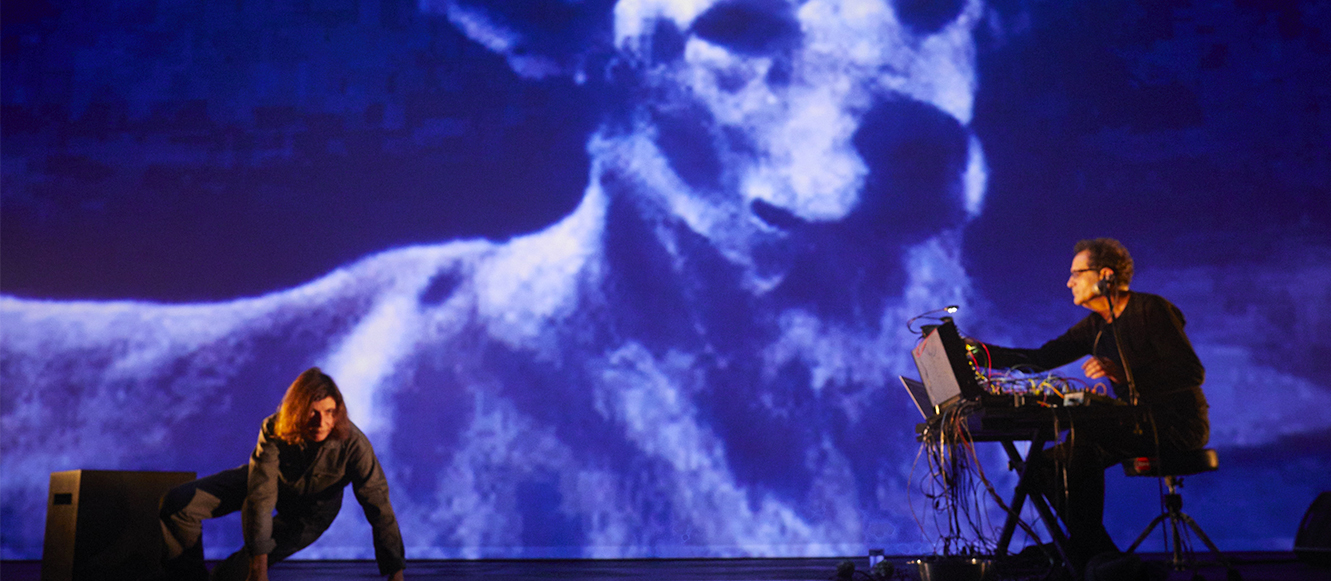The nine mongrels from the original novel Eloge des bâtards (Verticales, 2019) have decided to band together to fight against the destruction of a footbridge and the urban planning policies that are denaturing their town. To form an effective group, they're going to have to talk, explain their mongrel status, or more precisely, make the discovery (since they don't know, when the show begins, that they're also united by mongrelism). In a hostile surveillance environment of lights and furtive images, night is the only place where they can be protected and reunited.
Eryck Abecassis and Olivia Rosenthal, who are accustomed to performing as a duo, have decided to adapt this book for a performance in the form of a spoken concert, in which the characters' intersecting narratives become sound material that emerges in the night.
Through the combined effects of music and voice, sound and speech, the author and composer will bring to life the story of a group seeking other ways of being together and other ways of inhabiting places.
Staging principles
On stage, Olivia and Eryck represent the entire group of bastards. They are both the narrators of this story and the characters who speak in direct style.
The stage set-up is deliberately light, like the characters who move around discreetly because they're clandestine.
Eryck and Olivia face each other diagonally. The spectators are positioned around them as if in an arena (bi-frontal). In this way, the two performers can construct, under the gaze of a group to which they partly belong (the spectators' group), the nocturnal universe in which the action and narratives take place.
During the 4 nights that make up the show, Eryck and Olivia dialogue and respond to each other.
Olivia speaks and sings into the microphone, while Eryck composes the music and plays the guitar, equipped with multiple pedals that transform the sounds. His sound palette is very broad, from percussive playing to bow rubbing. He also uses all kinds of objects that resonate with the instrument's strings. In this way, Eryck adds a sensitive dimension to the world of words created by Olivia. And his voice helps build the stories that circulate in the night. The sound universe, where voice, sound, speech and music interpenetrate, creates the overall nocturnal, whispered or shouted atmosphere of this concert.
During their secret rendezvous, the bastards blend into neutral settings. They're super-aware of the price of disobedience, so their obsession is erasure. If they are illuminated, it's often by accident: car headlights, flashing lights, city lights.
Delegated production
GMEM - Centre national de création musicale
Support
La MéCa - La Maison Internationale des Écritures Contemporaines d'Aix-en-Provence
Olivia Rosenthal
French writer, novelist, playwright and performer
Olivia Rosenthal has published a dozen stories, including Eloge des bâtards (Verticales, Prix Transfuge 2019), Toutes les femmes sont des aliens (Verticales, 2016), Mécanismes de survie en milieu hostile (Verticales, 2014). She won the Prix du Livre Inter and the Prix Alexandre-Vialatte for Que font les rennes après Noël? (Verticales, 2010) and the Prix Wepler-Fondation La Poste for On n'est pas là pour disparaître (Verticales, 2007). Winner of the Villa Kujoyama in 2018, she published Un singe à ma fenêtre, the book resulting from this three-month residency in Japan, in September 2022 (Verticales).
Performer and playwright, Olivia Rosenthal writes for the theater and takes to the stage herself to present hybrid forms with artists from all disciplines. Performances(Macadam animal, conceived with composer and video artist Eryck Abecassis), opera libretto(Safety First, again with Eryck Abecassis), sound pieces, musical readings (with Bastien Lallemant, among others), lecture performances, short fiction films (with Laurent Larivière), she also makes various interventions (posters, frescoes) in the public space, all ways for her to renew and multiply the forms that literature can take.
Eryck Abecassis
composer, performer
Eryck Abecassis is a laureate of the Culture France Hors les murs - Médicis 2011 program.
Born in Algiers, he moved to Paris in 1975 to study cinema, photography and music. In 1981, he turned to music, studying composition (guitar, counterpoint-harmony) and later a course in computer music at Ircam.
His work, from stage to public space, explores a style on the bangs of established trends, energizing listening through musical research that intersects with other practices and modes of representation.
He performs internationally as a solo electronic musician, and currently interprets his electronic compositions on a modular synthesizer he has assembled.
Eryck Abecassis has been commissioned by numerous institutions, including : Radio France, Collège International de Philosophie, GMEM, GRAME, INA GRM, État Français, EMS Stockholm, Gamelan Bintang Tiga.
His works have been performed by the ensembles Accroche-note, 2e2m, the trio Aller-Retour, Insieme, L'Octuor de violoncelle, the trio Equinoxe, the ensemble Fa, L'EOC, the Quatuor Diotima, Kernel, Ars Nova, Bin-tang Tiga.
Eryck Abecassis is very active in the audiovisual field, and has written numerous soundtracks for documentaries and feature films.
Collaborations
Film: Jérôme Boivin, Partho Sen-Gupta, Michel Quinejure, Neasa Ní Chianáin, Rodrigo Littorriaga Music: Lars Åkerlund, Wilfried Wendling, Kasper Toeplitz, Reinhold Friedl, Francisco Meirino Theater: Judith Depaule, François Cervantès.
Dance: Cie Le Passagers, Fouad Boussouf
He is also a composer and designer of urban musical installations: Psykomuz II (commissioned by Lieux Publics), La Vague (Gmem, Lieux Publiques, cité-musique Marseille), Kloch (city of Poitiers), Rivière-Song (land-opera directed by Jean Boillot, Thionville).
Nominations: Sundance Festival and Tallinn (best film score).
Olivia Rosenthal
author
Eryck Abecassis
composer
NN
lighting designer

